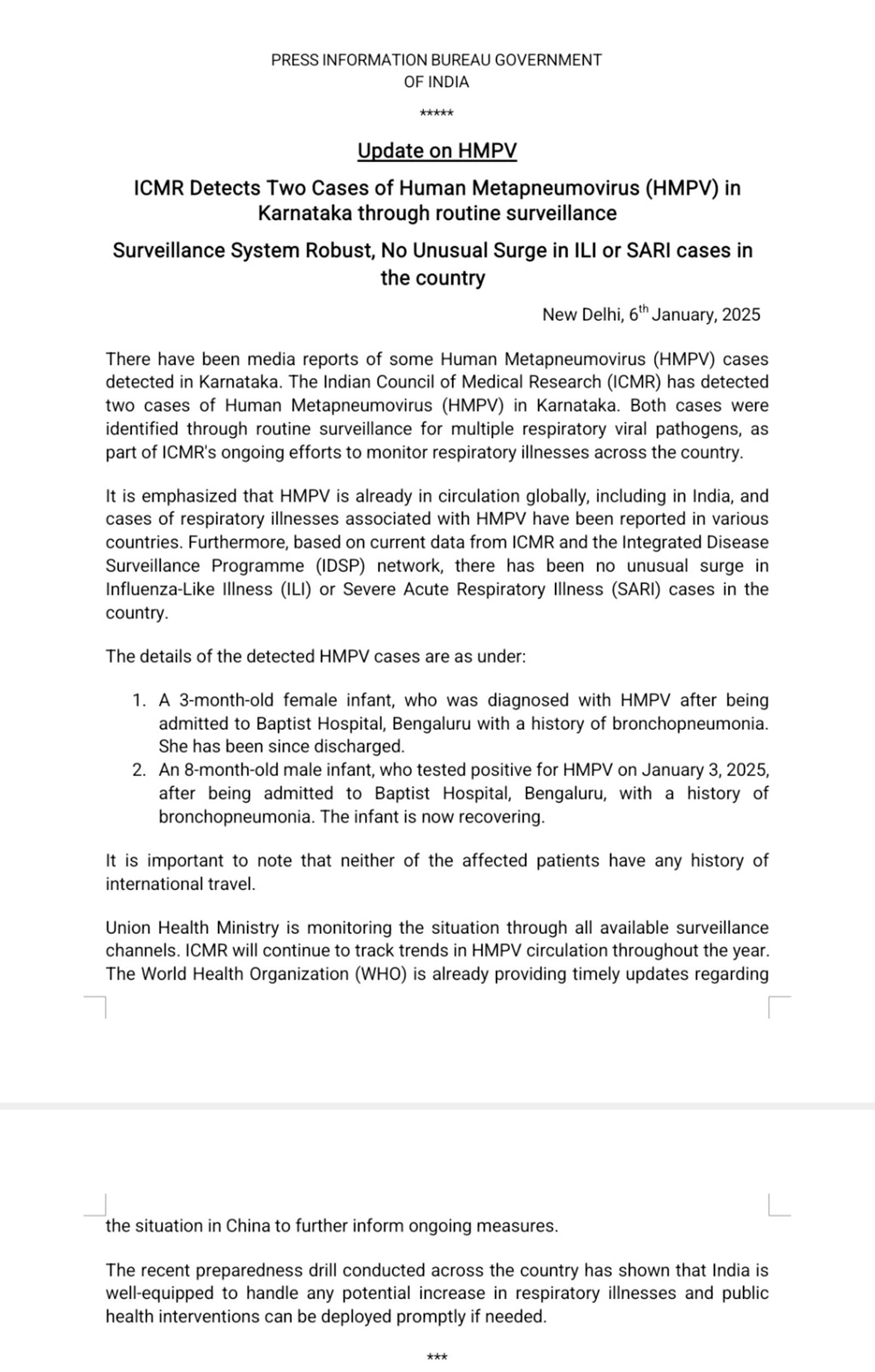Karnataka has reported two cases of human metapneumovirus (HMPV). While this virus may not be as widely known as influenza or COVID-19, it has been recognized as a significant cause of respiratory illnessesespecially in vulnerable populations.
According to the Government of India, “Both cases were identified through routine surveillance for multiple respiratory viral pathogens, as part of ICMR’s ongoing efforts to monitor respiratory illnesses across the country.”
The first case involves a three-month-old infant in Bengaluru with a history of bronchopneumonia, who has since been discharged. The second case concerns an eight-month-old infant with a similar history, currently undergoing treatment. Both cases were reported from Baptist hospital-Bengaluru.
Providing an update on the status of the virusthe Union Health Ministry issued a statement, saying, “HMPV is already in circulation globally, including in India, and cases of respiratory illnesses associated with HMPV have been reported in various countries.” It further stated that neither case had a history of international travel, indicating no link between these infections and the reported increase in respiratory cases in China.
With the detection of HMPV, understanding its impact, symptoms, and preventive measures is crucial.
But what exactly is HMPV, and how does it affect the body?
Dr Ravi Shekhar Jha, director, Pulmonology at Fortis Hospital Faridabad, tells indianexpress.com, “HMPV belongs to the same family as respiratory syncytial virus (RSV), which typically circulates during the winter months. It’s not limited to China but is prevalent across most Asian countries.”
Dr Shivakumar K, MD Respiratory Medicine and chief consultant pulmonologist at Kauvery Hospital, Marathahalli, Bengaluru, adds, “HMPV is an RNA virus with a genome encoding nine proteins, including F (fusion) and G (glycoprotein) proteins. These are critical for viral entry into host cells and immune response evasion.”

Is HMPV considered life-threatening or dangerous?
Dr Jha informs that in most cases, HMPV causes mild illness, such as cough, cold, and fever. “However, like COVID-19 or regular influenza, certain high-risk groups — such as immunocompromised individuals, organ transplant recipients, the elderly, and children under 5 — may experience more severe symptoms. Even in these cases, it is rare for the infection to become fatal,” he says.
Common symptoms of HMPV
Dr Shivakumar notes some common symptoms of this disease:
Mild Cases: Runny nose, cough, sore throat, and fever.
Severe cases: Wheezing, shortness of breath, and bronchitis. It may lead to pneumonia in severe cases, particularly in high-risk groups.
“Rarely, patients may experience severe symptoms like coughing up blood, which is a warning sign requiring immediate medical attention,” adds Dr Jha.
 In mild cases it can cause runny nose, cough, sore throat, and fever. (Source: Freepik)
In mild cases it can cause runny nose, cough, sore throat, and fever. (Source: Freepik)
Are there any strains of HMPV that have been detected?
Dr Jha says that the virus mutates very fast and keeps changing genetic structure, so there could be multiple strains. However, no specific strains have been identified or named yet.
How is HMPV transmitted, and what preventive measures can individuals take?
Dr Jha says that HMPV is highly contagious and spreads primarily through respiratory droplets, much like other respiratory viruses. “Transmission occurs when an infected person does not follow proper cough etiquette, or through contact with surfaces contaminated by respiratory secretions. Body fluids, such as saliva, can also facilitate its spread.”
“Preventive measures to reduce the risk of infection include Practicing good hand hygiene by washing hands with soap and water for at least 20 seconds, regularly disinfecting high-touch surfaces such as doorknobs, mobile phones, and countertops, and avoiding crowded places, especially during outbreaks,” explains Dr Shivakumar, adding that wearing a mask in public spaces can significantly reduce droplet transmission, and it is essential to stay home and isolate if experiencing symptoms to prevent spreading the virus.
DISCLAIMER: This article is based on information from the public domain and/or the experts we spoke to. Always consult your health practitioner before starting any routine.
Discover the benefits of our subscription!
Stay informed with access to our award-winning journalism.
Avoid misinformation with trusted, accurate reporting.
Make smarter decisions with insights that matter.
Choose your subscription package
